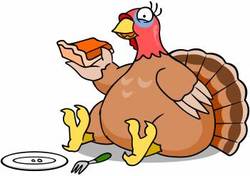 The holidays are here and food, treats and parties abound. The period between Thanksgiving and New Year’s is often tough for those of us trying to maintain or lose weight, but I am hoping to share a few tips to help you Maintain No Gain this holiday season! Maintaining our weight during the holidays is a vital step to curb our risk for obesity since studies show that the weight gained during the holidays is rarely lost. How much weight do we gain on average, anyhow? According to one study it ranges between 0.8 to 3.5 pounds with a net gain of just over 1 pound accounting for post-holiday weight loss. Another study found a similar 1 pound weight gain on average, however, weight gain was greater among individuals who were overweight or obese, and 14% gained >5 lbs. Whether its 1 or 5, imagine yourself 10 Thanksgivings from now – if we don’t make an effort to Maintain No Gain we’ll be 10 to 50 pounds heavier if in fact we don't maintain or shed those holiday pounds! Maintaining our weight during the holidays does not mean we have to forgo holiday parties or deprive ourselves of our favorite dishes. It just means that we have to have a plan. My proposed plan is three-fold, taking into account our eating habits, activity and our stress management techniques. Eating We eat to connect, to share love, to celebrate…to live! With mindfulness and strategy we can have our cake and eat it too as they say. Eat mindfully - Perform an internal check-in and gauge how hungry (or hangry!) you are. Listen to your body’s natural intuition and eat when you’re hungry and stop when you’re full. Better yet, stop at 80%. In Japanese there is a word for this: hara hachi bu! Pay attention to what you’re eating, chew more and slooww down…you know it takes about 20 minutes for our stomachs and all those hormones to communicate to our brains that we’re full, right? Bring your own dish - Unless you have a favorite holiday dessert that you can’t bear not to make, bring a healthy salad, roasted vegetable side dish or fruit-based dessert to the party! Start with soup or salad - Studies have shown that you eat less during a single sitting if you start the meal off with a water-based soup or a green salad. It’s all about that Volume! Sit away from the buffet table! - Sitting or standing near food increases our propensity to eat. Select a smaller plate or bowl - Larger plates can make a serving of food appear smaller, and smaller plates can lead us to misjudge that very same quantity of food as being significantly larger. For example, one study showed how those who were given larger bowls served and consumed 16% more cereal than those given smaller bowls. Watch what you drink - Yes, you should watch your liquid calorie intake, but also beware of alcohol’s power to lower your inhibitions and disregard your hunger/fullness signals. Research before you eat out - Find the menu online and do research beforehand! Find the broiled, grilled and baked entrees, ask for condiments and dressing on the side. Don’t be shy and ask the waiter if entrees can be made with less oil. Try to pass up the bread and chips and remember to hydrate! Hunger is often confused for thirst. Just say "No" – From that coworker to the Betty Crocker encouraging you to clean your plate or take a to-go container of sweets, just say “No” (well, preferably “No, thank you.”). Culturally it may be hard, but when you are advocating for your health they should understand. Also, just because it's on your plate or in your hand doesn't mean you have to eat it. Activity Even following all of the aforementioned eating advice, it’s still likely that we will overindulge and do it more frequently in the 6 weeks between Thanksgiving and New Year’s. That is why maintaining an active (and even more active…) life during the holidays should be another part of our game plan. Exercise burns calories – and when we’re consuming more than we need, we've gotta burn ‘em off or we will become that statistic and gain those 1 to 5 holiday pounds. Incorporate fitness into your celebrations – Can you inspire a post-meal walk (or “D” aka Digestion walk) after your family meal? What about a weekend hike, Zumba video or flag football game? The holidays don’t have to be spent sitting around the table 24/7. Spice it up! Hit up the ice rink, pool or gym if you have some saved up passes to share. Sign up for a holiday Fitness event – there are tons of Turkey Trots to choose from. Sign up for a 5K walk or run and be a healthy role model for your family. Signing up for a race is also a great motivator as you have your event in sight and are motivated to train for it. What other fitness events are in your neighborhood or local gym? Maybe create a challenge organically with your friends and neighbors! Put on your pedometer! - Did you know that those who wear pedometers walk 2,000 more steps/day than those who don’t? And speaking of steps…have your and your family’s goal be 10,000 steps a day! I know you can do it. Stress Management Holiday weight gain is more than just the greater availability of delicious food. Holidays can be a time of stress for many, hosting parties, buying gifts, managing difficult reunions and often experiencing loneliness. We eat not only to nourish but to console, distract and to suppress our anxieties. Stress also seems to affect food preferences, increasing our intake of foods high in fat, sugar, or both. A variety of hormones may be to blame (insulin, cortisol, and ghrelin), as they become elevate alongside our elevated stress. Stick to a budget – finances are often at the root of holiday stress. Before you go gift and food shopping, decide how much money you can afford to spend. Then stick to your budget. Don't try to buy happiness with an avalanche of gifts. Also, opt for homemade gifts, start family gift exchanges and look for free and cheap holiday options. Make some time for yourself – The holidays are about giving, but don’t forget to give to yourself! Spending just 15 minutes alone, without distractions, may refresh you enough to handle everything you need to do. Find something that reduces stress by clearing your mind, slowing your breathing and restoring inner calm. Perhaps a walk in nature, enjoy a bubble bath (scratch that…there’s a drought upon us!), get a massage, read a book, meditate or practice yoga. Journal it up - Before turning to the leftover pie to distract yourself from an argument or the stress of a “perfect” holiday, write down your thoughts. Practice creative problem solving and seek advice from friends, rather than comfort from the fridge. Also, don’t forget that those who use an exercise and food journal loose 2x more weight than those who don’t. Delegate! - Are there some household projects, decorating or shopping trips that you can ask your friends and family to assist with? Foster an atmosphere of teamwork and connection than being the “perfect” hostess. Think positive - Positive thinking and optimism are key parts of effective stress management regime. Manage and understand your self-talk and practice gratitude! Its easy to scan the world for the negative, but the more you scan for the positive the more good you will see! Maintain your sleep schedule – Our time off work may give us more opportunities to stay up late and party, but call it quits early enough so that you can get plenty of sleep. Aim for at least seven hours of sleep each night. Best of luck in your efforts to Maintain No Gain! Please share your go-to weight maintenance techniques and let me know on January 1st if your scale looks familiar to what it looks like tonight! I'll be sure to check in with my progress. Thanks for reading!
2 Comments
 I struggle with getting enough sleep during the week and I know I’m not alone. Chronic sleep loss is rampant in today's society. The National Institutes of Health suggests that school-age children need at least 10 hours of sleep daily, teens need 9-10 hours, and adults need 7-8 hours; however, nearly 30% of adults reported an average of 6 hours or less of sleep per day and only 31% of high school students getting at least 8 hours of sleep on an average school night. Sleep is often sacrificed to watch TV and manage our many responsibilities working, doing chores and homework, child rearing, exercising, etc. However, it may be time to review our priorities and see if we can put sleep more towards the top. We can drink our red bulls and pour that second (third, or fourth) cup of coffee, but lost sleep is nothing to scoff at. Beyond it being related to car crashes and reduced productivity and libido, chronic sleep loss can contribute to a host of health problems: Weight gain and altered metabolism: Sleep deprivation increases insulin resistance and screws up our concentrations of leptin and ghrelin (two key opposing hormones in appetite regulation), making us more hungry. It also significantly decreases activity in appetite evaluation regions in our brains, making us crave high-calorie foods! Cardiovascular health: Short sleep has been linked to high blood pressure, an exaggerated inflammatory response, and increased stress hormone levels. Learning and memory: The quantity and quality of sleep have a profound impact on learning and memory. Research suggests that sleep helps learning and memory through its role in the consolidation of memory and enhancing our ability to focus, which are essential for learning new information. Immune system: Sleep deprivation alters immune function, including the activity of the body’s killer cells. Keeping up with sleep may also help fight cancer. Healthy Sleep Advice If you are having problems sleeping, the National Sleep Foundation suggests the following to improve your sleep:
|
AuthorHello and welcome! My name is Andrea Notch Mayzeles. I am a Certified Health Education Specialist, Mom, and Master of Public Health dedicated to the path of well-being. As a wellness professional I am committed to continued learning and am here to share research, recipes and musings on health, psychology, personal development, and parenting. I hope you enjoy! Categories
All
|

 RSS Feed
RSS Feed